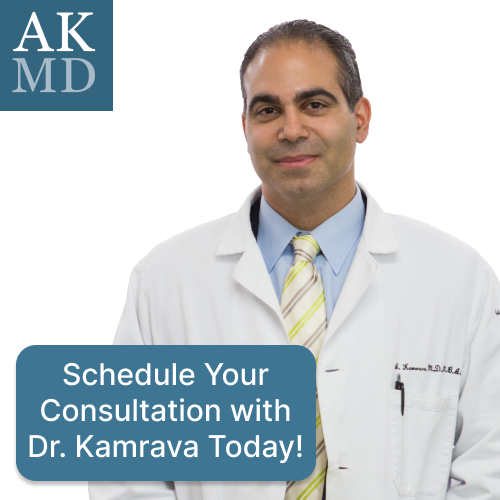Rectal cancer and colon cancer are similar because they both start as small polyps in the large intestine. The rectum is the last six inches of the digestive system, including the anus. When polyps and tumors form along the intestinal lining and are not treated, they may develop into cancerous masses. Like colon cancer, early detection of rectal cancer is vitally important. Both diseases develop slowly and are treatable if detected before they have a chance to grow.
Dr. Kamrava is fellowship-trained and board-certified in colon and rectal surgery. He specializes in advanced treatments of colorectal cancers to provide the most effective and cutting-edge care possible.
Who Is At Risk?
If someone in your family has been diagnosed with colon cancer, you’ll want to start the screening process for both colon and rectal cancer 10 years before the age that he or she was diagnosed. For other individuals, colon cancer and rectal cancer screenings should begin at age 50.
 Rectal Cancer Symptoms
Rectal Cancer Symptoms
Early-stage rectal cancer often has no symptoms, so screenings for the disease prior to the development of symptoms is the best way to catch the disease before it becomes more advanced. If you suspect that you have symptoms of rectal cancer, contact a colorectal specialist who can give you a complete examination as soon as possible.
When polyps or tumors develop in the rectum, they may change the consistency, shape, or frequently of bowel movements. Other physical symptoms that may indicate the presence of rectal cancer are rectal bleeding, bloody stool, rectal pain, diarrhea, unusual bowel habits, weakness, fatigue, bloating, change in appetite, and sudden weight loss.
Screenings and Colonoscopy
When rectal cancer is detected early, your surgeon can address the disease before it has a chance to develop further. During a colonoscopy, the large intestine will be examined with a colonoscope. A visual inspection will check your rectum for ulcers, polyps, tumors, or any other abnormalities. Rectal tissue may also be removed and biopsied. The biopsy will determine whether or not a polyp is cancerous. Your doctor will then be able to recommend the most appropriate treatment.
Rectal Cancer Frequently Asked Questions
There are many similarities between colon and rectal cancer, so it is very difficult to determine if you have either disease without a thorough examination by a colorectal expert. When you visit Dr. Kamrava, he will evaluate your specific situation and discuss the best way to proceed. If you are concerned about rectal cancer and do not find the answer to your question below, call our office at 424.279.8222 to schedule an appointment.
Q: What is rectal cancer?
A: The rectum is the last 15 centimeters of the digestive system. When a person develops a polyp, it is a precancerous mass that will develop into cancer over time.
Q: What are rectal cancer symptoms?
A: There are no symptoms of early-stage rectal cancer. When rectal cancer has progressed, pain in the rectum and bleeding are common symptoms. Consult a colorectal specialist who can help diagnose your medical condition if you experience bloody stool, abdominal pain, fatigue, or extreme weight loss.
Q: At what age should I get a colonoscopy?
A: Individuals should get colonoscopies starting at age 50 to screen for rectal cancer. Every 10 years, you should have a follow-up screening, which is the same time frame that you should follow for colon cancer screenings. If you have a family member who has been diagnosed with colon or rectal cancer, you should have your first colonoscopy 10 years before his or her age at the time of the diagnosis.
Q: Are tumors or polyps in the rectum always cancerous?
A: Tumors or polyps in the rectum are not always cancerous but they need to be removed by a colorectal specialist. Rectal polyps that have not developed into advanced stages of cancer can be removed through a polypectomy, local excision, or local transanal resection.
Q: What are the best treatment options for rectal cancer?
A: If you have rectal cancer, Dr. Kamrava will determine the best treatment plan for your individual situation. Surgery, chemotherapy, and radiation are some of the methods that may be used to address your condition.
Call Today to Schedule a Rectal Cancer Consultation With Dr. Kamrava
To learn more about rectal cancer, schedule a consultation with Dr. Kamrava. He is a colorectal specialist who has extensive experience diagnosing and treating rectal cancer. Call our office today at 424.279.8222!
Next, learn about anal cancer.




